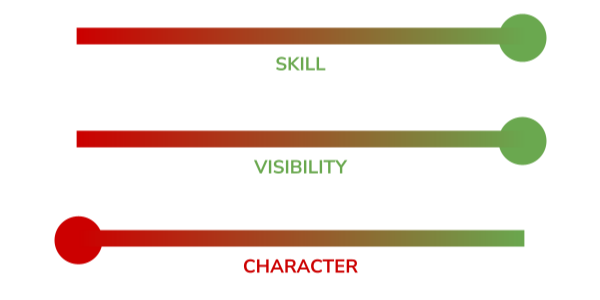
Skill x Visibility x Character = Influence
Yes, that may in fact describe an "effective" leader. Leaders who are highly skilled and visible are more likely to achieve their goals and make a significant impact. But what kind of impact?
That's why character matters.
The leaders of tobacco companies, for example, were found guilty of knowing they were indirectly killing people in the pursuit of profit. (Now they're leading the ultra-processed food companies with similar collateral damage.) Or worse, people like Hitler who directly killed 6 million Jews while trying to make Germany a self-sufficient nation by expanding their territory.
Other leaders like the Soviet Union's Stalin, China's Mao, and Cambodia's Pol Pot were almost as bad, but Hitler is the most extreme example. Viewing his leadership through the following traits helps us understand how an effective, but morally bankrupt, leader can achieve their goals in the light of day while having a profoundly destructive impact on the world.
SKILL 🎯
Hitler’s ability to manipulate political systems and public sentiment played a significant role in his rise to power. He exploited economic woes and nationalistic fervor to rally support for his radical ideas. He formed strategic alliances with wealthy business leaders to gain influence. His political maneuvering, including his use of legal means to achieve his goals, demonstrated a certain political acumen, even as his policies and actions led to catastrophic consequences for Germany and the world.
VISIBILITY 👀
Hitler carefully crafted his image as a strong and powerful leader and was masterful in his ability to leverage the media to make that image a constant presence in the lives of German citizens. He was well known for his charismatic and forceful speaking style at large rallies, which were designed to incite strong emotions and support for his radical ideas. Maximizing his visibility was a key part of his strategy to gain control over the Nazi Party and eventually the German state.
CHARACTER ⚖️
Morals and ethics both play significant roles in shaping a person's character. Morals are personal beliefs about right and wrong. Ethics are external standards for how to act in a group or society. Together, they are what separates us from the other animals. Our humanity guides how we treat others.
Hitler used his charisma to manipulate and control others. He was known for his authoritarian leadership style and demanding absolute loyalty. He was ruthless in eliminating his opponents, both within his party and in the broader political landscape. As a nationalist, he believed in the superiority of the German people and sought to restore Germany to a position of power and dominance. His goals required access to more resources and land, which is why he invaded Poland, the Soviet Union, and other countries. He was obsessive and determined, REGARDLESS OF THE COST.
And that’s my point.
👉 Effective leaders with good morals and ethics consider the costs as they strive to make the world a better place. Without good character, the costs are irrelevant as long as they get what they want. They don't care who they hurt along the way.
Leaders with bad character may pursue…
- Power or control. Even if it causes widespread fear and the loss of freedom.
- Their ideology. Even if it causes social division and violence. Most wars have been fought for political, ethnic, or religious differences.
- Revenge. Even if it creates widespread conflict and harm.
- Fame or legacy. Even if it glorifies harmful actions, causes instability, and long-lasting trauma.
- Chaos. Even if it causes instability, suffering, societal collapse, and loss of safety and security.
- Money. Even if they have to violate ethical boundaries and harm those who helped them get it. Cigarette anyone? 😤
A BROKEN CLOCK IS RIGHT TWICE A DAY 🕒
Sometimes, even bad people can do good things.
- Hitler built the autobahns (highways), reduced unemployment, and stimulated the economy.
- Stalin helped us defeat Hitler and transformed the Soviet Union into an industrial superpower.
- Mao reduced inequality, improved literacy, and improved public health.
But at what cost?
It's not always WHAT you do, but HOW you do it that matters. Be human. Relentlessly pursuing your goals without considering the costs and the negative impact on others can lead to profoundly destructive outcomes for your people, your organization, and perhaps, the world.
Keep Striving ✈️